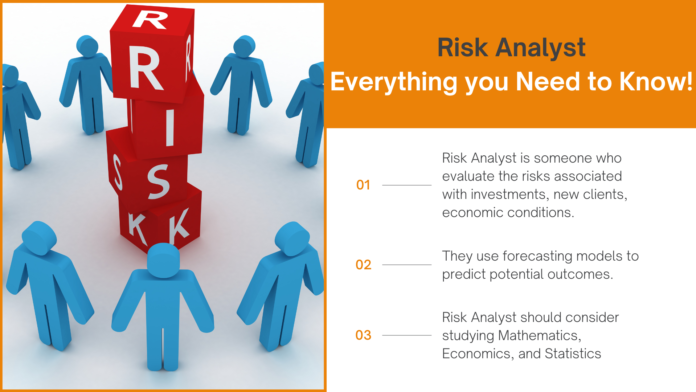Introduction
Risk Analyst is a financial professional who evaluate the risks associated with investments, new clients, economic conditions, or regulations to ascertain the safety of making a financial decision. They use forecasting models to predict potential outcomes and offer advisement on mitigating risks. The following steps should be taken when pursuing a career in risk analysis:
Students seeking a career as a Risk Analyst should consider studying Mathematics, Economics, and Statistics during their 10+2 schooling. To gain admission into college, applicants should strive to attain at least 50% marks in their higher secondary board examination.
Select an Appropriate Bachelor’s Degree
Due to employers typically looking for those with a Bachelor’s degree, potential Risk Analyst should consider pursuing either a Bachelor of Business Administration (BBA) or Bachelor of Commerce (B.Com). Additionally, many colleges require passing an entrance exam such as Delhi University Entrance Examination (DUET), Christ University Entrance Test (CUET).
Once you’ve completed your undergraduate studies, it may be time to consider pursuing a postgraduate degree. Specialized courses in risk management can be found at MBA level with options for specializations such as risk management, finance, business analytics, entrepreneurship or marketing. Alternatively, a Master of Commerce (M.Com) degree program provides specializations in accounting, taxation, banking and finance or mathematics. For those looking to gain an even higher level of understanding in the field of risk management, degrees such as the Master of Economics, Master of Statistics or Master of Finance and Control are all viable options.
For those looking to gain more practical knowledge and industry exposure without committing to further study just yet, entry-level jobs can provide this opportunity. Researching companies that may have job openings that match your skillset is the first step towards finding an ideal role in the risk management services sector – think investment companies, insurance companies, banks and other financial institutions.
Skills of a Risk Analyst
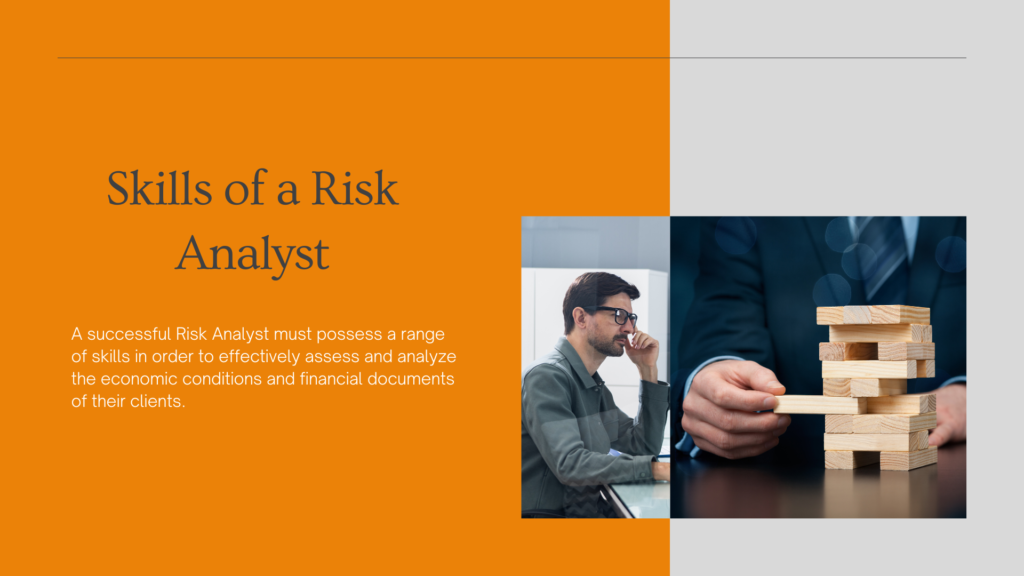
A Risk Analyst plays an integral role in helping the companies they work for stay financially healthy. A successful Risk Analyst must possess a range of skills in order to effectively assess and analyze the economic conditions and financial documents of their clients. Additionally, they must have a thorough understanding of both the market and industry their client operate within in order to evaluate competition. For those working in accounting or investment firms, they must be able to analyze client portfolios, calculate potential losses and review prospective loan applications.
To acquire these skills, it is important to engage in challenging tasks and projects that require analytical thinking as well as problem-solving ability. This can help you develop strong analytical skills that are necessary for success when assessing various solutions to a problem. Finally, having comprehensive knowledge on industry trends and market movements is essential as this enables a Risk Analyst to make informed decisions on investments or loans.
Industry and market knowledge Skills
A Risk Analyst can work in various industries, such as finance, retail, insurance or energy. Having a comprehensive understanding of the industry in which they are operating is paramount to success in this role. In-depth knowledge of the marketplace and organizational activities helps them identify risks and priorities for the company. This expertise may include risk factors such as market risks, operational and technological risks, corporate risk management and regulatory risks. Additionally, it is vital that they possess an awareness of broader risk issues and regulations for specific industries and businesses.
Communication and presentation skills
Strong communication and presentation capabilities are essential for risk analysts. Part of their responsibilities is to explain complex financial products and risk management principles to senior management as well as non-technical audiences. They may also present their findings at board meetings by summarizing various risks, outlining the potential danger a company is facing, and recommending a suitable course of action for management groups to follow, excellent communication skills allow them to interact effectively.
A Risk Analyst needs to be immersed in the industry they serve, be it finance, retail, insurance or energy. With a deep dive into the marketplace and organizational activities, they can detect risks and set priorities accordingly. Whereas market risks target a company’s internal strategies, operational and technological risks assess potential external threats. Corporate risk management evaluates opportunities for growth and development, while regulatory risks keep the organization in line with applicable laws.
To stay informed on broader risk issues and regulations for specific industries, analysts must keep up with changes in their field. With such a technical role comes an equally important responsibility: effective communication and presentation skills.
A Risk Analyst must be able to explain complex financial products and risk management practices to senior management and non-technical audiences alike. At board meetings, they must clearly outline what risks the company is facing while proposing viable solutions. Furthermore, they must be able to interact with regulators, third-party agencies and customers to successfully mediate any conflicts that arise.
Sharp Negotiation Tactics
A Risk Analyst should regularly collaborate with auditors and other departments, utilizing their shrewd negotiation tactics to convince their colleagues and business partners to remain vigilant of any potential risks or threats to the company. A risk analyst may also haggle over the terms of payment and other legal agreements.
Tech-Savviness
Employers frequently seek out Risk Analyst who possess a working knowledge of computers and the capability to quickly learn how to use new technology or tools. This expertise allows them to accurately use statistical and other analytical programs. Risk analysis often necessitates using various software packages and programs, so aspiring risk analysts should strive to familiarize themselves with the most popular ones while completing their education or training.
Importance of Risk Analyst
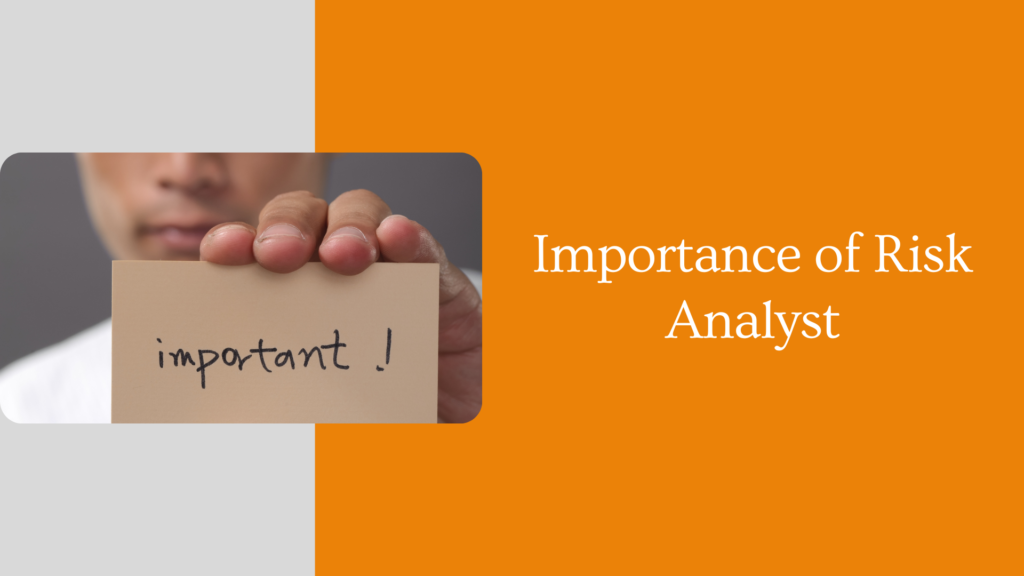
A Risk Analyst is responsible for effectively managing the risks associated with investments in order to ensure the financial success of the organization they work for. Their primary role is to identify and analyze potential risks in different areas, and then develop suitable strategies for mitigating those risks while maximizing profits.
In doing this, A Risk Analyst carries out a range of activities, such as reviewing financial and accounting documents, researching industry developments and other related sources, monitoring compliance requirements, studying the economic effects of current events and anticipating how these could impact the economy and financial industry, creating contingency plans for emergency scenarios such as a market crash due to a pandemic or changes in government policy, and hedging against risks.
Scope of a Risk Analyst

A Risk Analyst is essential for any organization that is looking to successfully manage their investments and ensure financial success. Their scope of work involves identifying and analyzing potential risks associated with the organization’s investments, then developing risk mitigation strategies to minimize the risks while maximizing gains.
The range of responsibilities a Risk Analyst has can be varied and complex, requiring a thorough understanding of the financial industry. This includes reviewing financial and accounting-related documents, researching industry developments and other resources, monitoring compliance requirements, and creating contingency plans in case of a market crash or another unforeseen event such as a pandemic or government policy change. A Risk Analyst also needs to be proactive in hedging against risk to ensure their organization’s investments remain secure.
Types of Risk Analyst
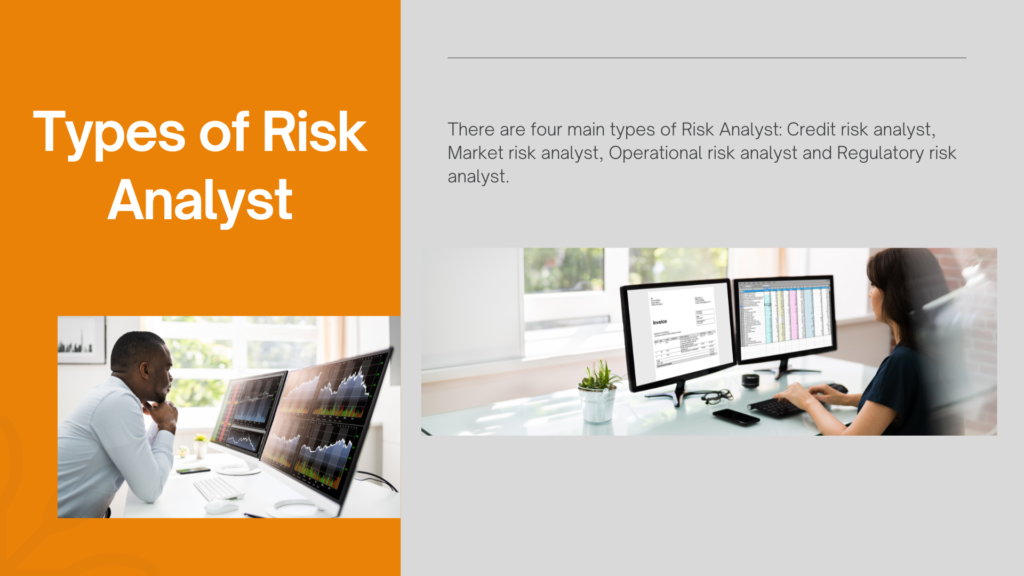
A Risk Analyst job is highly sought after in the areas of trading, financial services and private banking. There are four main types of Risk Analyst: Credit risk analyst, Market risk analyst, Operational risk analyst and Regulatory risk analyst.
Credit Risk Analyst analyzes the potential risks a company or organization may face due to defaults on loans, credit or unpaid goods/services by their customers. The salary range for a credit risk analyst is typically between $29,624.75 to $37,919.68, which can be affected by the seniority level of the role. This role is especially important for investment banks and companies as they help to identify counterparty risks when purchasing exotic options or other products. Investment banks and investment companies heavily rely on credit risk analysts to assess counterparty risks when making such investments.
Market Risk Analyst assesses the negative effects that could arise from external factors such as an economic recession that may have an impact on share prices. Market Risk Analysts usually earn between $109,234 to $115,800 depending on experience
An Operational Risk Analyst is a vital figure in any organization, ensuring that any potentially hazardous or costly occurrences are managed appropriately. From employee fraud to product malfunction and system failure, they analyze the effects of such risks on the company. Salaries for this role range from $5,001.86 – $23,184.31, making it an attractive career option.
Having contingencies in place can make all the difference when it comes to mitigating risk – especially during times of crisis such as pandemics and recessions. An operational Risk Analyst helps companies create plans that can cushion its blows from these potential disasters.
A Regulatory Risk Analyst is responsible for identifying the effects of existing and upcoming legislation on their organization. Their salary ranges from $44,000 to $89,000 depending on experience and skill set. It is an important role as it helps organizations stay compliant with regulations and avoid costly penalties down the line.
To become a successful Risk Analyst, it is essential to equip oneself with the right set of knowledge and qualifications. Entry-level positions typically require a college diploma or undergraduate university degree, while senior positions may require a graduate degree or PhD/doctoral candidates. When it comes to academic background and fields. A Risk Analyst should consider Mathematics, Engineering, Finance, Actuarial Science, Risk Management, Mathematical Finance, Information Systems, Statistics, Business Administration and Basic Sciences.
To further strengthen one’s application for the job role of a Risk Analyst, employers may prefer candidates who possess certifications such as Associate in Risk Management (ARM), Chartered Financial Analyst (CFA), Financial Risk Manager (FRM) and Professional Risk Manager (PRM). In addition to academic qualifications and certifications, strong traits such as problem-solving skills and analytical abilities are essential for becoming a Risk Analyst.
How to Become a Risk Analyst?
For aspiring Risk Analyst, One must-have traits are a highly analytical mind, a firm grasp of mathematics, knowledge of data analysis, an innate strategic mindset for mitigating risk, a go-getter attitude and coordination skills to understand the needs of different departments in terms of risk. But beyond these technical qualifications lies an unspoken requirement – sheer determination and dedication to the work. This steadfastness can help ensure success and longevity in this vital profession.
A Risk Analyst often work full-time but some firms may hire them on a contractual basis. To be successful in securing a Risk Analyst job, one must possess certain skills. These include: honing your relevant skills; seeking suitable career opportunities; preparing for interviews; and engaging in continuous professional development. The path to becoming a Risk Analyst begins with the narrowing of skill gaps and the attainment of the preferred educational degree. Even on a personal level, it is essential to demonstrate exemplary credentials when applying for such positions.
When beginning your search for the ideal career opportunity, it is important to identify potential employers and apply for roles that best match your qualifications. Additionally, LinkedIn can be an invaluable resource in creating a professional presence and making yourself more visible to recruiters. Furthermore, professional development should become a priority once hired into an analyst position, as staying abreast of industry trends will enable you to stand out amongst colleagues and make a greater impact. Investing in yourself by attending seminars, completing certifications, and pursuing additional training will ensure that you remain competitive in the field.
A Risk Analyst is a career which is in high demand across a variety of industries, from commercial banks and trading firms to investment banks, financial services institutions, risk management consulting firms, and insurance companies. Some of the top employers of Risk Analyst include J.P. Morgan, Barclays, HSBC Holdings, HDFC Bank and Credit Suisse – meaning that they can be found in both public and private sector organizations.
For those considering a career in financial risk analysis, it is important to note that it is an ever-evolving field – perfect for those who are curious and passionate about learning. It also requires a high level of organization to track economic conditions and investment trends as well as evaluate data sets to make sound decisions under uncertain circumstances.
Financial institutions rely on a Risk Analyst with a unique blend of analytical and communication capabilities, as well as proven statistical aptitude and mathematical proficiency. To illustrate the type of assessments that a Risk Analyst performs, consider two examples:
Risk scoring is an intricate process which involves weighing potential risks according to their likelihood and level of impact, requiring the manipulation of discreet percentages, relative and fixed values, and statistical distributions.
Financial risk modeling is a calculation of risk volatility which assists businesses in making decisions regarding investment opportunities; this activity necessitates assigning independent and dependent variables in order to evaluate their influence on each other.
Qualification Required to be a Risk Analyst
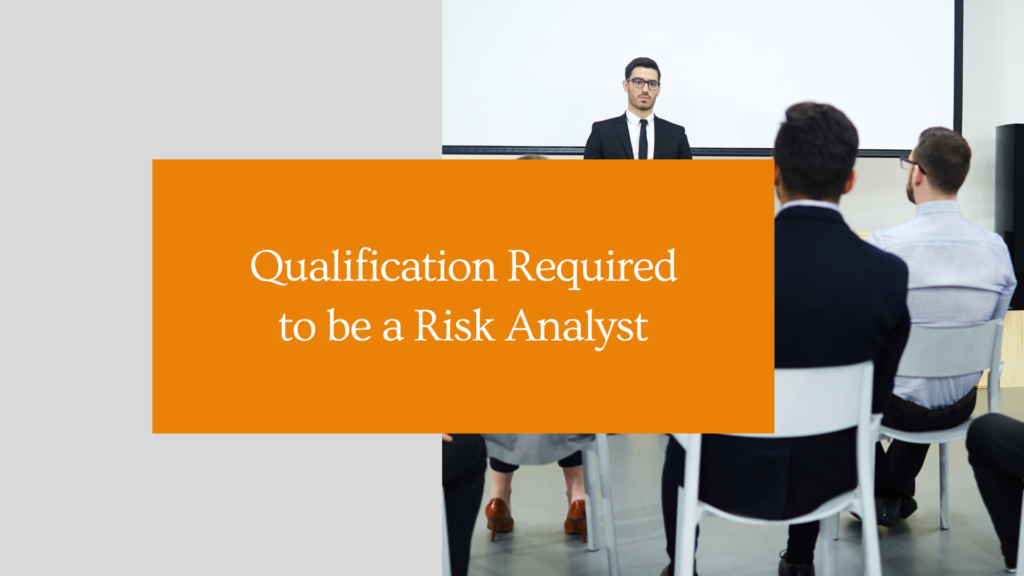
To become a successful Risk Analyst, It requires an appropriate combination of education and abilities. Although qualifications may vary from employer to employer, most positions require at least a college degree. An Associate’s Degree may be sufficient for some entry-level roles; however, advancement usually necessitates obtaining a Bachelor’s Degree.
A Bachelor’s Degree is the least requirement for entry-level risk analyst positions, such as a Bachelor’s in Finance, Mathematics or Economics. Courses in investments and risk management can be beneficial for career advancement. Those with advanced degrees, such as an MBA with a specialization in International Business, may have increased opportunities for employment.
Salary of a Risk Analyst
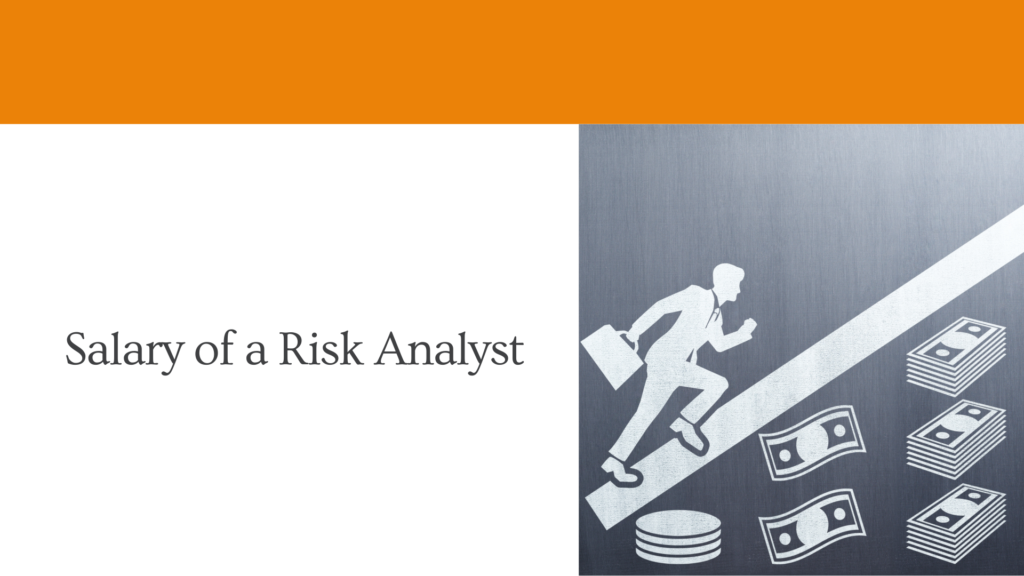
The Labor Bureau Statistics reported that the average annual salary of financial analysts, including Risk Analyst, was $99,430 in May 2017; while the top 10% earned salaries above $165,580 annually. Individual salary ranges and job prospects depend on the candidate’s location, education and experience.
To become a successful Risk Analyst, applicants must possess strong educational background in finance and understand investment risk systems and portfolio management. Furthermore, they need to demonstrate excellent analytical and mathematical abilities as well as knowledge of statistics and other analytical tools. Employers also seek candidates with exceptional organizational and communication skills. With continued education or experience on the job,
Conclusion
The capacity to communicate intricate ideas to a broad audience, problem-solving and project management aptitudes, and an eye for precision are all essential qualifications for progression in this field. With increased work experience and/or an advanced degree, advancement opportunities may present themselves. Training is normally hands-on, combining both internal and external courses. For example, graduates who are part of a risk graduate scheme will often spend between one year to 1.5 years gaining expertise in varied risk functions before specializing in any particular area such as risk analysis.
Financial risk analysis is ever-changing; thus it is necessary to stay up to date with Continuing Professional Development (CPD) initiatives which employers typically finance by offering relevant examinations leading to industry-approved certifications such as:
The capacity to elucidate intricate concepts to a vast audience, problem-solving and project management aptitudes, and remarkable attention to detail are all essential traits required for success in this field. With additional work experience and/or an advanced degree, advancement is possible.
Training normally takes place on the job, combining both in-house and external courses. For example, graduates on a risk graduate scheme will typically devote 12 to 18 months gaining experience with different risk functions before zeroing in on a certain area such as risk analysis. This gives you an overall knowledge of the extensive range of risk functions. Financial risk analysis is ever-evolving and it is important to take part in continuing professional development (CPD) in order to stay abreast of the latest industry standards. Employers often assist you with taking applicable exams which will lead to industry-recognised qualifications. These qualifications include:
Risk is an ever-expanding field with numerous career opportunities. Advancement rates and pathways will depend on the type and size of employer you work for, and you may need to switch between companies to progress. Large organizations often have a more organized career path, where you can move up into management roles. For instance, in a major financial institution, a career trajectory might look something like this: credit risk analyst, senior credit risk analyst, risk manager, senior manager or managing director.
Risk consultancies offer the opportunity to dive into the lucrative world of consultancy, many of which provide graduate programs in risk management. There are also options to transition out of risk and into other finance roles. With corporate governance initiatives and an increasingly restrictive and costly insurance market, analysts have been given a heightened status within organizations – their importance is being acknowledged more frequently, with some risk managers even being assigned places at the executive level or as board members.
Frequently Asked Questions (FAQs)
The job of a Risk Analyst requires an impressive set of skills, including strong numeracy, analytical and strategy capabilities, as well as exceptional research, planning, organizational, problem-solving, IT competence and computer literacy. Moreover, successful Risk Analysts must be able to effectively communicate their complex findings through both written and verbal means.
Risk Analysts can expect a mid-career salary of ₹8.2 Lakhs per year with 4-9 years of experience in the field. Experienced Risk Analysts with 10-20 years of experience can even earn up to ₹10.9 Lakhs per year!
Despite the potential for high rewards, Risk Analysts face a unique set of challenges including stressful market and credit risk management roles that often leave one feeling disempowered.
Yes, being a Risk Analyst is a good job. This role has significant room for growth, pays fairly well, and is an in-demand job position. A risk analyst helps companies minimize the liabilities involved with business decisions by analyzing economic conditions and financial documents and providing advice.
The Cyber Risk Analyst supports the analysis, classification, and response to cybersecurity risks within an organization. This professional addresses cybersecurity risk and analyses the potential business and customer risk, aligning processes and controls to the relevant frameworks and internal systems.
A Risk Analyst is a business expert responsible for determining the potential consequences of performing a business action. Their duties include reading and analyzing financial data, creating visual models to represent possible outcomes and preparing reports about business decisions.
Risk management offers a high degree of job security. This field often appeals to those who enjoy solving problems, putting their quantitative and analytical skills to the test. Good work life balance for a career in finance, with decent compensation to match.




